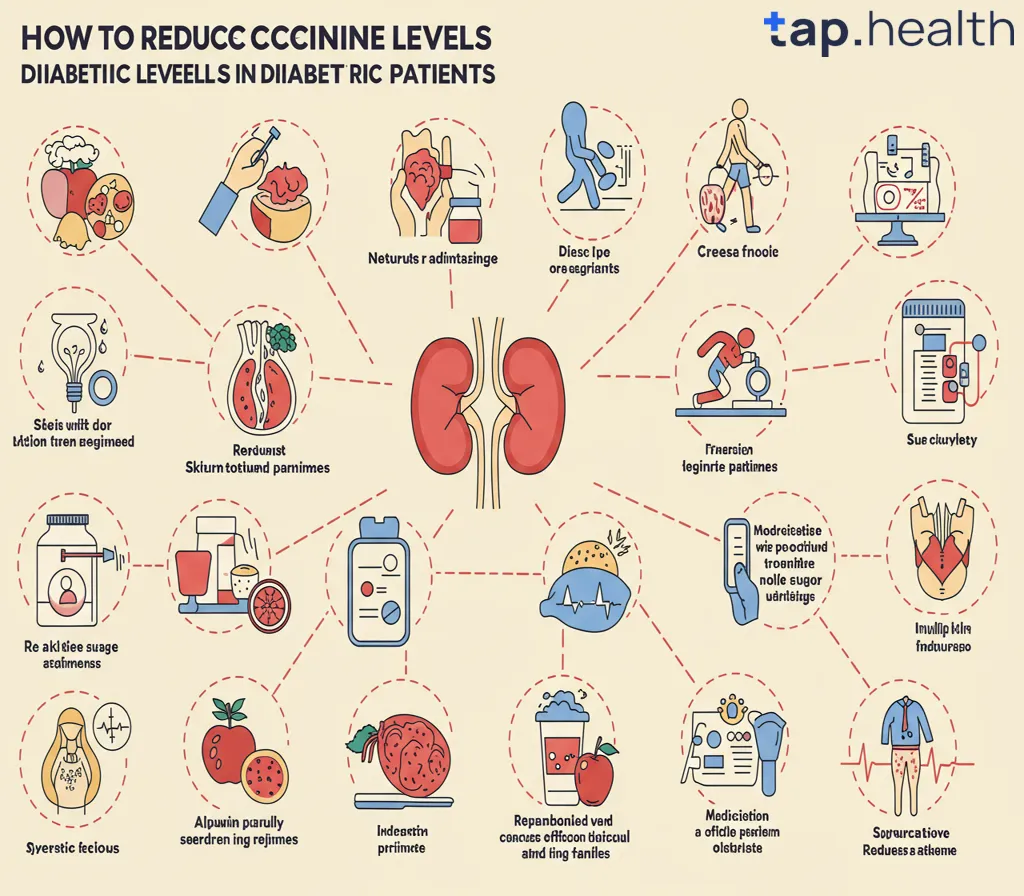Diabetes can have numerous complications if not well-managed, and one of the most serious of these is kidney damage. When kidney function is impaired, the body has trouble filtering waste products, and one of the byproducts that accumulate is creatinine. High levels of creatinine in the blood are often an indicator of kidney dysfunction.
In diabetic patients, high creatinine levels are a common sign of diabetic nephropathy, which is a form of kidney disease caused by long-term diabetes. Understanding how to reduce creatinine levels in diabetic patients is crucial for maintaining kidney health and preventing further complications.
In this comprehensive guide, we will explore the causes of high creatinine levels in diabetic patients, the symptoms to watch out for, and most importantly, the steps you can take to reduce creatinine levels through lifestyle changes, diet, and natural remedies.
What is Creatinine?
Creatinine is a waste product that the body produces when muscles break down creatine, a substance involved in energy production in muscle cells. Creatinine is usually filtered by the kidneys and eliminated through urine. Therefore, creatinine levels in the blood can serve as an indicator of kidney function.
High creatinine levels can be a sign that the kidneys are not functioning properly, as they cannot filter out this waste product as efficiently. Creatinine levels can be measured through a simple blood test, and high levels are often associated with kidney disease.
Why Do Diabetic Patients Have High Creatinine Levels?
In people with diabetes, especially those with poorly controlled blood sugar levels over time, diabetic nephropathy (kidney disease caused by diabetes) is a common complication. Over time, high blood sugar damages the small blood vessels in the kidneys, reducing their ability to filter out waste effectively.
1. High Blood Sugar
Consistently high blood sugar levels can damage the blood vessels in the kidneys, leading to impaired kidney function. This results in the kidneys being less efficient at filtering creatinine, causing its buildup in the bloodstream.
2. High Blood Pressure
Many diabetic patients also suffer from high blood pressure, which can worsen kidney damage. The combination of high blood sugar and high blood pressure significantly increases the risk of kidney failure.
3. Chronic Kidney Disease (CKD)
When kidney function becomes severely impaired, chronic kidney disease (CKD) can occur. High creatinine levels are often a sign of CKD, which can progress to kidney failure if not properly managed.
Symptoms of High Creatinine Levels in Diabetic Patients
High creatinine levels themselves do not typically cause symptoms until kidney function has significantly declined. However, as kidney damage progresses, diabetic patients may experience the following symptoms:
- Fatigue: Feeling tired or weak due to the body’s inability to filter waste efficiently.
- Swelling: Especially in the legs, ankles, and feet, as the kidneys can no longer remove excess fluid from the body.
- Shortness of Breath: Fluid buildup in the lungs may cause breathing difficulties.
- Nausea and Vomiting: The buildup of waste products can cause digestive disturbances.
- Changes in Urination: Urinating more frequently or less frequently than usual, or noticing changes in the color of urine.
If you are diabetic and notice any of these symptoms, it is important to see a healthcare provider for further evaluation.
How to Reduce Creatinine Levels in Diabetic Patients
While creatinine levels cannot always be reversed, there are several effective ways to manage and reduce creatinine levels in diabetic patients. These methods involve improving kidney function, managing blood sugar and blood pressure, and adopting healthier lifestyle habits.
1. Control Blood Sugar Levels
The most important factor in preventing and managing kidney disease in diabetic patients is keeping blood sugar levels under control. Poor blood sugar management accelerates kidney damage, so controlling glucose levels can help prevent further increases in creatinine.
How to Control Blood Sugar:
- Monitor your blood sugar levels regularly to ensure they stay within the recommended range.
- Follow a healthy diet low in refined sugars and high in fiber.
- Take your diabetes medication as prescribed by your healthcare provider.
- Exercise regularly to improve insulin sensitivity and help control blood sugar.
- Manage stress, as stress can raise blood sugar levels.
2. Manage Blood Pressure
High blood pressure is one of the leading causes of kidney damage in diabetic patients. Reducing high blood pressure can prevent further damage to the kidneys and help lower creatinine levels.
How to Lower Blood Pressure:
- Limit sodium intake by avoiding processed foods and choosing low-sodium alternatives.
- Increase your intake of potassium-rich foods, such as bananas, spinach, and potatoes, as potassium helps lower blood pressure.
- Exercise regularly to improve cardiovascular health and reduce blood pressure.
- Take prescribed antihypertensive medications as directed by your doctor.
- Practice relaxation techniques, such as deep breathing, meditation, or yoga, to reduce stress and help lower blood pressure.
3. Adopt a Kidney-Friendly Diet
A proper diet is essential for managing creatinine levels and kidney health. A kidney-friendly diet helps reduce the workload on the kidneys and can prevent further kidney damage.
Foods to Include:
- Fresh fruits and vegetables: These provide essential vitamins and minerals without putting too much strain on the kidneys. Choose low-potassium options like apples, berries, and cucumbers.
- Whole grains: Foods like oats, quinoa, and brown rice are rich in fiber and have a lower glycemic index.
- Lean proteins: Foods like chicken, turkey, and fish are excellent protein sources that are easier on the kidneys than red meat.
- Healthy fats: Olive oil, avocados, and nuts provide healthy fats that are good for kidney health.
Foods to Avoid:
- High-sodium foods: Processed foods, canned soups, and salty snacks can raise blood pressure and damage kidneys.
- Red meats: High consumption of red meat can put extra strain on the kidneys and elevate creatinine levels.
- Foods high in potassium: If kidney function is impaired, consuming too much potassium can be harmful. Limit high-potassium foods such as bananas, tomatoes, and potatoes.
4. Increase Water Intake
Staying hydrated is important for kidney health. Drinking plenty of water helps the kidneys flush out waste products, including creatinine, and supports their function.
How to Hydrate:
- Aim for at least 8 cups of water a day, or more if you are physically active.
- Limit sugary drinks and alcohol, as these can dehydrate the body and increase blood sugar.
- Monitor your kidney function to ensure you are drinking enough without overloading your kidneys, especially if kidney disease is already present.
5. Herbal Remedies for Kidney Health
Certain herbs and natural supplements may help reduce creatinine levels and support kidney health. However, it’s important to talk to a healthcare provider before using any herbal remedies, as they may interact with medications.
Herbs and Remedies to Consider:
- Ginger: Known for its anti-inflammatory properties, ginger may help reduce creatinine levels by improving kidney function.
- Dandelion root: A natural diuretic, dandelion root can help flush out toxins and reduce creatinine levels.
- Turmeric: Curcumin, the active compound in turmeric, has been shown to have protective effects on kidney health and may help lower creatinine levels.
- Nettle leaf: Nettle is used in traditional medicine to support kidney health and may help lower creatinine levels.
6. Quit Smoking
Smoking can worsen kidney function and increase the risk of complications in diabetic patients. Quitting smoking can improve blood circulation, reduce blood pressure, and promote kidney health.
7. Exercise Regularly
Regular physical activity can help control blood sugar, lower blood pressure, improve circulation, and maintain a healthy weight. All of these factors contribute to better kidney health and can help reduce creatinine levels.
Recommended Exercises:
- Walking: A simple and effective form of exercise that improves overall health.
- Swimming: Low-impact exercise that is gentle on the joints while providing a full-body workout.
- Yoga: Improves flexibility, circulation, and stress management.
When Should Diabetic Patients Seek Medical Help?
If you’re a diabetic patient experiencing high creatinine levels or kidney-related symptoms, it’s important to consult your healthcare provider. Early intervention can help prevent further damage and protect kidney function.
Seek medical help if you experience:
- Unexplained fatigue or weakness
- Swelling in the legs, feet, or ankles
- Changes in urination patterns
- Shortness of breath
- Nausea or vomiting
Frequently Asked Questions (FAQs) on How to Reduce Creatinine Levels in Diabetic Patients?
1. Can creatinine levels go down naturally?
Yes, creatinine levels can go down naturally with lifestyle changes such as improving diet, controlling blood sugar, and managing blood pressure. Drinking more water, exercising regularly, and using herbal remedies may also help lower creatinine levels.
2. Is creatinine level of 1.5 dangerous for diabetic patients?
A creatinine level of 1.5 mg/dL is slightly elevated but not necessarily dangerous. However, it may indicate early-stage kidney dysfunction, especially in diabetic patients. It is important to monitor kidney function closely and consult your healthcare provider for further evaluation.
3. How long does it take to reduce creatinine levels?
The time it takes to reduce creatinine levels depends on the severity of kidney dysfunction and how effectively you manage your blood sugar, blood pressure, and overall health. With consistent lifestyle changes, it may take weeks to months to see improvements in creatinine levels.
4. Can a kidney-friendly diet help lower creatinine levels?
Yes, a kidney-friendly diet that is low in sodium, protein, and potassium, and high in fiber, can help support kidney function and lower creatinine levels. It’s important to work with a nutritionist to develop a diet plan that is tailored to your needs.
5. Can herbal remedies reduce creatinine levels in diabetic patients?
Certain herbs, such as ginger, turmeric, and dandelion root, have been shown to have kidney-protective effects and may help reduce creatinine levels. However, these should be used under the guidance of a healthcare provider to ensure safety and effectiveness.
Conclusion
Reducing creatinine levels in diabetic patients is essential for preventing kidney damage and maintaining overall health. Through a combination of controlling blood sugar, managing blood pressure, following a kidney-friendly diet, staying hydrated, and incorporating regular exercise, you can help reduce creatinine levels and protect your kidneys. Always work with your healthcare provider to monitor kidney function and discuss the best approach for managing creatinine levels based on your individual needs.



